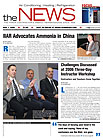In other foreign markets, advances were made towards global standardization. ARI and Mexico’s electrical standards development agency, the Associación de Normalización y Certificación (ANCE), signed a memorandum of understanding this year recognizing their shared interests in advancing the harmonization of ARI and Mexican HVACR standards and international and regional standards in general. As part of its global trade efforts, ARI has signed similar agreements with China and Korea.
Europe also leveraged profound effect on the United States after July 1, 2006. The European Union (EU) created the Waste Electrical and Electronics Equipment (WEEE) directive. This directive required manufacturers to work with local government agencies to ensure that electrical and electronic waste is disposed of in an environmentally responsible manner.
The EU also mandated the restriction of the use of certain hazardous substances in electrical and electronic equipment (RoHS) directive. This directive banned the marketing of any electrical or electronic equipment that contains lead, cadmium, mercury, hexavalent chromium, or the flame-retardants polybrominated biphenyl (PBB) and polybrominated dyphenyl ether (PBDE).
Publication date: 12/25/2006
Publication date: 12/25/2006

China’s impact on the U.S. economy made news in 2006. As its HVACR market continued to emerge, rising issues needed to be addressed. Refrigerant compliance and standards surfaced as primary targets for manufacturers. To combat inferior refrigerants, Honeywell began a certification program for Chinese air conditioner manufacturers that identified them as users of HFC-410A refrigerant purchased from licensed suppliers. As part of the certification, Honeywell began recommending certified Chinese equipment makers, such as Haier Group and Hisense Co. Ltd., to key buyers in Europe.
Rapid growth in China brought many visitors to the country. The Gas Appliance Manufacturers Association, for example, arranged individual “matchmaking” meetings with Chinese manufacturers, distributors, and other business contacts in Shanghai, for participants this past fall.
The Air-Conditioning and Refrigeration Institute (ARI) also worked on its relationship with China during a meeting with Pingjun Liu, administrator of the Standards Administration of China (SAC). Together they launched www.standardsportal.org. The Website was developed by the American National Standards Institute (ANSI), SAC, and the National Institute of Standards and Technology (NIST), and was intended to be a resource for those seeking information on U.S. and Chinese standards, certification, and trade information.
Sharing the market with China created some materials problems this past year. The increased demand for copper, not just in the United States, inspired a large spike in international copper prices. As China continues to develop, other greater demands on raw materials may be experienced.

Report Abusive Comment